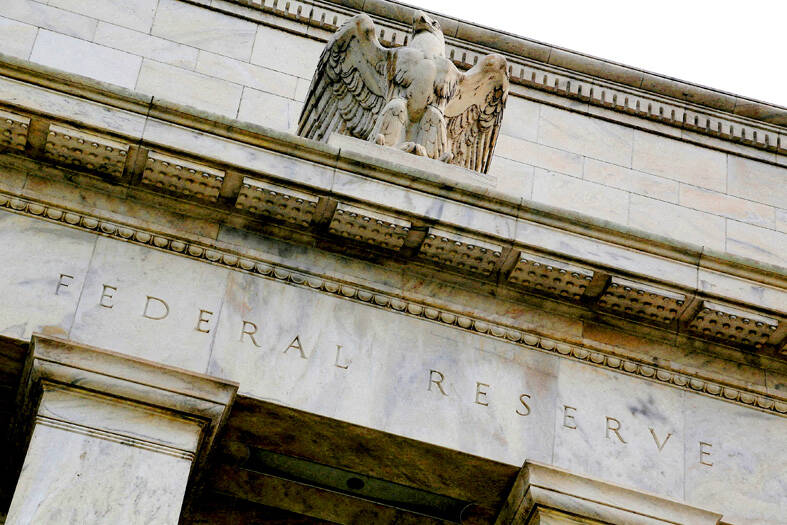The US Federal Reserve is “absolutely” prepared to intervene to help calm nervous financial markets, a senior central bank official said on Friday, after US President Donald Trump’s tariff plans roiled Wall Street.
The US president on April 2 announced sweeping import taxes on dozens of countries, only to abruptly, temporarily roll many of them back to 10 percent last week in response to turbulence in the stock and bond markets, while leaving China with new tariffs totaling 145 percent.
The Fed would “absolutely be prepared” to deploy its various tools to help stabilize the financial markets if the need arose, Boston Fed President Susan Collins told the Financial Times in an interview published on Friday.

Photo: Reuters
Any intervention by the Fed would depend on “what conditions we were seeing,” added Collins, who is one of 12 voting members of the Fed’s all-important rate-setting committee this year.
“The higher the tariffs are, the more the potential slowdown in growth as well as elevation and inflation that one would expect,” Collins said in a separate interview with Yahoo Finance earlier on Friday, adding that she expects inflation to rise “well above” 3 percent this year, but no “significant” economic downturn.
Since Trump’s tariffs came into effect earlier this month, Fed officials have been more outspoken than usual about the effects of the government’s plans on inflation and growth. A widely referenced consumer sentiment survey published on Friday by the University of Michigan showed a sharp drop in consumer confidence, and flagged another worrying rise in both short-term and longer-term inflation expectations.
For now, the survey on inflation expectations remains an outlier, with financial market measures of inflation expectation still largely pricing in a long-term path closer to the Fed’s two percent target.
In a speech in Hot Springs, Arkansas on Friday, St Louis Fed President Alberto Musalem said “continued vigilance” and “careful monitoring” of the incoming data was needed.
Musalem, a voting member of the Fed’s rate-setting committee this year, said that while he still expects a “moderate” pace of economic expansion, the near-term risks were “skewed” toward rising inflation, slower economic growth and a cooler labor market.
“I would be wary of assuming the impact of high tariffs on inflation would be only brief or limited,” he said.
On a busy day of speeches from central bank officials, New York Fed President John Williams went further than his colleagues on the bank’s rate-setting committee, putting out estimates of how he expects Trump’s immigration and tariff policies — and the uncertainty surrounding them — to affect the US economy this year.
“I now expect real GDP growth will slow considerably from last year’s pace, likely to somewhat below one percent,” he told a conference in Puerto Rico.
“With this downshift in the pace of growth ... I expect the unemployment rate to rise from its current level of 4.2 percent to between 4.5 and 5 percent over the next year,” he said.
Williams added that he expected increased tariffs to “boost inflation this year to somewhere between 3.5 and 4 percent” — well above the bank’s long-term target.

The Eurovision Song Contest has seen a surge in punter interest at the bookmakers, becoming a major betting event, experts said ahead of last night’s giant glamfest in Basel. “Eurovision has quietly become one of the biggest betting events of the year,” said Tomi Huttunen, senior manager of the Online Computer Finland (OCS) betting and casino platform. Betting sites have long been used to gauge which way voters might be leaning ahead of the world’s biggest televised live music event. However, bookmakers highlight a huge increase in engagement in recent years — and this year in particular. “We’ve already passed 2023’s total activity and

Nvidia Corp CEO Jensen Huang (黃仁勳) today announced that his company has selected "Beitou Shilin" in Taipei for its new Taiwan office, called Nvidia Constellation, putting an end to months of speculation. Industry sources have said that the tech giant has been eyeing the Beitou Shilin Science Park as the site of its new overseas headquarters, and speculated that the new headquarters would be built on two plots of land designated as "T17" and "T18," which span 3.89 hectares in the park. "I think it's time for us to reveal one of the largest products we've ever built," Huang said near the

China yesterday announced anti-dumping duties as high as 74.9 percent on imports of polyoxymethylene (POM) copolymers, a type of engineering plastic, from Taiwan, the US, the EU and Japan. The Chinese Ministry of Commerce’s findings conclude a probe launched in May last year, shortly after the US sharply increased tariffs on Chinese electric vehicles, computer chips and other imports. POM copolymers can partially replace metals such as copper and zinc, and have various applications, including in auto parts, electronics and medical equipment, the Chinese ministry has said. In January, it said initial investigations had determined that dumping was taking place, and implemented preliminary

Intel Corp yesterday reinforced its determination to strengthen its partnerships with Taiwan’s ecosystem partners including original-electronic-manufacturing (OEM) companies such as Hon Hai Precision Industry Co (鴻海精密) and chipmaker United Microelectronics Corp (UMC, 聯電). “Tonight marks a new beginning. We renew our new partnership with Taiwan ecosystem,” Intel new chief executive officer Tan Lip-bu (陳立武) said at a dinner with representatives from the company’s local partners, celebrating the 40th anniversary of the US chip giant’s presence in Taiwan. Tan took the reins at Intel six weeks ago aiming to reform the chipmaker and revive its past glory. This is the first time Tan